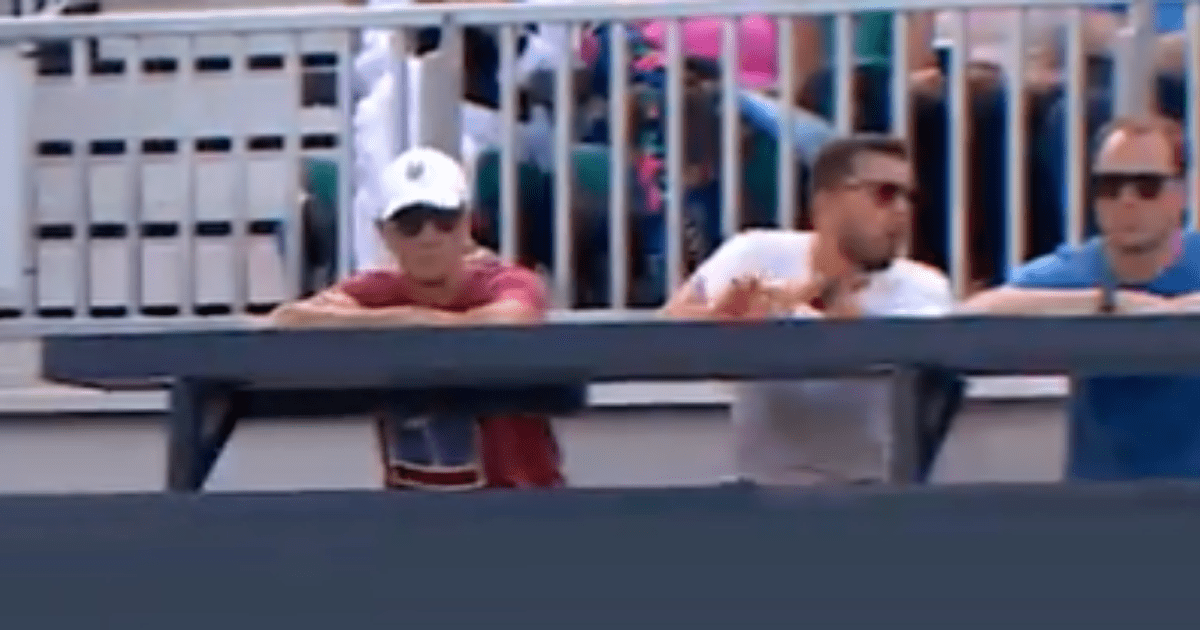What Happened?
Jannik Sinner, ranked No3 in the world, left his physio, Giacomo Naldi, in agony after accidentally hitting him in the groin with a tennis ball during the Miami Open. The mishap occurred when Sinner tried to return a powerful serve from opponent Christopher O'Connell but only managed to hit the edge of his racquet, sending the ball flying off the court and landing in Naldi's private parts.
Reaction and Apology
Despite the painful incident, Sinner and his team found humor in the situation, with the rest of the camp left in hysterics. Sinner, upon seeing Naldi in agony, joined in the laughter, showing good sportsmanship. After the match, Sinner expressed regret, acknowledging the mishap and hoping for Naldi's quick recovery. Fans and commentators also found the moment amusing, adding to the light-hearted atmosphere.
Onward to Victory
Despite the unintentional mishap, Sinner managed to recompose himself and secure a spot in the quarter-finals with a 6-4 6-3 win over O'Connell. He is set to face Tomas Machac in the next round, following his recent success at the Australian Open and the Rotterdam Open. Sinner's impressive performance on the court continues to captivate fans and solidify his position as a top player in the tennis world.
Frequently Asked Questions
How can a tennis athlete balance intense training and school?
Balance between academic obligations and intensive training schedules can be difficult for aspiring players. The ability to manage time, prioritize, and create a schedule that works for you is essential. Online education and flexible academic programs are a great way to accommodate the hectic training and travel schedules that young athletes have. Support from parents, coaches and educational establishments is essential to ensure that players can achieve their goals while maintaining their education.
How important is nutrition and diet to training as an elite tennis player
Tennis players do not fall short of the requirements for a healthy diet and nutrition. Dietary intake is important for intensive training because it provides energy, facilitates recovery and reduces the risk of injury. Diets of elite athletes typically include a balance of carbohydrates, protein, and fats as well as essential vitamins and minerals. Maintaining a fluid balance and preventing fatigue is also important.
How important is it to compete in junior tournaments for a career in professional tennis?
It is important to compete in junior tournaments if you want to pursue a career as a professional player. These tournaments allow young athletes to practice their skills and gain match experience against other players. They also help them to learn how to handle the pressure of competition. These tournaments can also be a stepping-stone to higher level competitions, as well as impacting a player’s ranking, visibility with coaches and sponsors and overall development.
When can a player start training to improve their chances of becoming a pro?
While there is no set age to begin training for professional tennis, starting at a young age does provide an advantage. Many professional tennis players begin training in their early teens. Early development helps players build a strong foundation in terms of technique, skills and coordination. Balance training and general childhood development is crucial for fostering a passion in the sport, without burning out or causing injury.
What role does video analysis play in training top tennis players?
Video analysis is a critical tool for training and developing top tennis players. It is a great tool for reviewing technique, tactics and patterns of opponents. Coaches and athletes use video analysis to break down strokes, pinpoint improvement areas, and strategize with future opponents. It also aids in recognizing habits and tendencies that may go unnoticed during the heat of competition, enabling more targeted and efficient practice sessions.
Statistics
- Approximately 70% of a professional tennis player’s training time is devoted to developing technique and on-court strategies.
- Studies show that superior agility and speed among tennis players can reduce their reaction time by up to 30%, which is crucial during high-level matches.
- Engaging in structured video analysis sessions has been shown to improve a player’s tactical decision-making by approximately 35%.
- Statistical trends indicate that top tennis players usually have at least 5 people in their support team, including coaches, fitness trainers, and physiotherapists.
- Strength and conditioning coaches emphasize core strength, noting that an increase in core stability can improve shot accuracy by up to 43%.
External Links
tennisfitness.com
myprocoach.net
optimumtennis.net
tenniscompanion.org
topendsports.com
How To
Tennis Mental Toughness: How to improve it
It is important to take a multifaceted strategy when improving mental toughness. Start by setting clear, achievable goals and measuring your progress against them. Employ visualization techniques to mentally rehearse match situations and your responses to them. You can improve your concentration and calmness under pressure by practicing mindfulness and deep breath exercises. During matches and training, you should focus more on the procedure than the final result. You will be able to maintain a regular routine. View setbacks in a positive light and develop coping techniques with the help of a coach or sports psychologist. You can improve your mental toughness by regularly exposing yourself to stressful situations.
Did you miss our previous article…
https://www.sportingexcitement.com/tennis/andy-murray-reveals-ruptured-ankle-ligaments-wimbledon-future-in-doubt/

